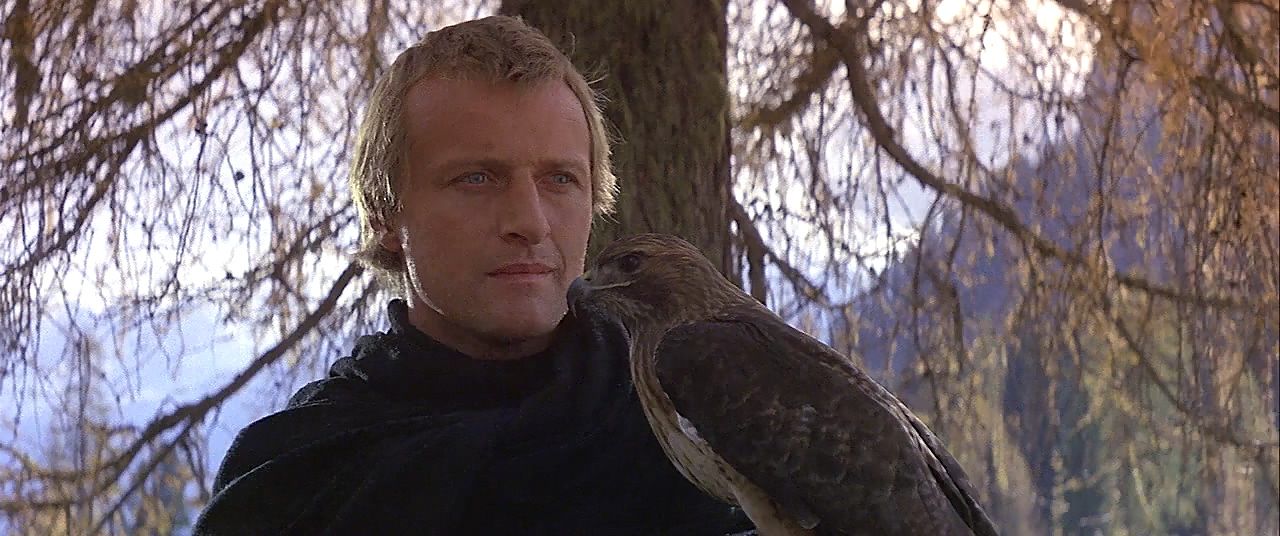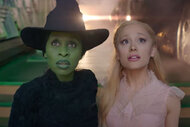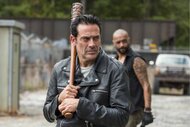Create a free profile to get unlimited access to exclusive videos, sweepstakes, and more!
Tears in rain: 8 of our favorite moments from Rutger Hauer's career

Though he was most famous for his unforgettable turn as Roy Batty in Blade Runner, there was so much more to the career of Rutger Hauer. He died last week at the age of 75, but he leaves behind a body of work that any actor would be proud of. He may have gained notoriety for playing a synthetic replicant, but his work was truly and deeply human.
On this sad occasion, we've decided to go through his career and celebrate him by taking a look at some of our favorite scenes from the films that he appeared in. From 1969 until his death (he has several credits listed as still pending, or being in production), Hauer left behind a rich legacy, and it didn't always come from the realms of genre.
We're looking at all of it, and we're not ranking, either. There will be no numbers, no winners, and no losers. Though our final entry here won't surprise anyone in the slightest (it is, without a doubt, his most legendary scene ... no way around it), we're only interested in celebrating, not critiquing. Here's to you, Mr. Hauer, and here's to all of the moments you gave us.
Batman Begins — "Didn't you get the memo?"
When it comes to corporate villains who smile through their teeth and you while stabbing you in the back, Hauer's Mr. Earle in Christopher Nolan's first Batman film is right up there with the worst of them. The above scene is great, but it's not our favorite in terms of scenes that feature him. That honor would have to go to a later scene with Morgan Freeman's Lucius Fox, where Earle fires Fox in a particularly slippery tone... before saying to Fox, "didn't you get the memo?"
The line pays off at the end of the film when Bruce gives Earle's job to Fox, and Fox gets to say the line back to Earle. Still, the reason it stands out is how incredibly slimy the first rendition of it is delivered by Hauer. His pronunciation of "memoooo" should be taught in schools.
Turkish Delight — At the table
It's not easy to describe this 1973 Paul Verhoeven film, but Hauer is fantastic throughout this film. The moment we selected really stands out, though. It's small, it's gross, and it's played to perfection.
Hauer's character, Eric, just tries to stand up from a dinner table during a party and then proceeds to unleash one of the best vomit-takes we've ever seen. That kind of acting ain't easy. It comes off as completely natural and real, and that's why we include it.
The Last Kingdom — "You are a warrior."
As the Viking Ravn on the highly underrated The Last Kingdom, Hauer (spoiler) doesn't live through the pilot. He's not alone — a few other big names that are poised to be major players get dusted before the episode is done. Still, the scenes that he does have stick out from the pack.
Delivering exposition in a scene while also keeping things exciting is a challenge for any actor, but you'd never know it by the way Hauer makes it work. Ravn is blind, and a Viking wise man — he takes young Uthred under his wing after the boy's family is lost, and for all intents and purposes, Ravn begins Uthred on the journey that we'll follow for the rest of the series.
Not only does Hauer play one hell of a Viking, he also manages to map out the complicated history of early Britain in the process, with your Mercias and Northumbrias and Wessexes all included. Ravn gives wisdom like a drunk and violent Gandalf— he warns Uthred to never, ever fight Ubba (which Uthred eventually does), and also gives the lost child some comfort, telling him, "You are a warrior." Prophetic words, because that is precisely what Uthred grows up to be.
Though he only makes this one appearance, it is vital, and it is powerful.
The Blood of Heroes — "Walk... slowly."
This 1989 film finds Hauer in the role of Sallow, and he gets mixed up in a future free from technology where people play a bloody form of football using a dog skull. Are you sold yet?
Hauer is great throughout, but the most memorable moment comes during the beatdown scene seen above. Sallow and his team emerge from the contest, looking like ultimate bada**es who would give Mad Max a run for his money. He turns to Kidda, who now has the dog skull, and because "Lord Vile" is watching, he urges her to strut to the goal and says "walk.. slowly."
If this isn't one of the coolest and all-around most awesome ways to tell someone to savor a victory and also rub it in someone's face, then we're lost within this life of ours.
Ladyhawke — Don't mess with Captain Navarre
Technically, Matthew Broderick is the lead of Richard Donner's 1985 fantasy, Ladyhawke. He plays the central character, sure, but come on. Hauer steals this movie the minute he shows up with a crossbow and a sword as the dashing and formidable Captain Navarre.
It's not his skills with a variety of weapons that impress, although they do definitely do that. It's the panache and swagger that Hauer gives off while performing them that makes it great. The very '80s synth score either helps or hinders, we can't decide, but Hauer dominates this scene, as well as the movie as a whole.
Rutger Hauer + crossbow = yes please, more if you don't mind.
Hobo with a Shotgun — Chewing on glass
This one hurts, and it hurts bad. As the titular hobo in the 2011 pulp Hobo With a Shotgun, Hauer's character is forced to undergo all kinds of degrading acts before he finally snaps and goes full-on vigilante... using... as you may have guessed... a shotgun.
Nothing is more humiliating or degrading that what he is forced to do for money in the scene above. He has to break glass over his head, and then the evil children that made him do it make him eat that glass in order to get the money that he was promised. It's easy for a movie like this to make you feel nothing at all, but just try not to feel something when Hauer looks into the camera with a mouth full of glass.
You feel every ounce of his humiliation, as well as his sadness. You also feel a sense of his boiling rage churning ever closer to the surface, and for a moment, he appears to actually start relishing the glass chewing. Maybe he thinks he deserves it, who knows. It's one of the most heartbreaking moments that Hauer ever performed.
Blind Fury — The ol' hot sauce gag
Vietnam vet Nick Parker may be blind in Blind Fury (1989), but he's no idiot. He can take whatever hot sauce trick you want to pull on him, and yep, he'll kick your ass right afterward too.
Hauer not only sells the blindness, but he expertly sells the childlike fun of the character. He seems to be fighting these idiots before he even realizes it, and the result is priceless. He has moments of much more "fury" later on in the movie, but this scene sticks out because of Hauer's charm, as with most of his work, appears to be effortless.;
Blade Runner — "...like tears in rain."
Was there ever a doubt that this would be here? We know, we said we weren't going to play favorites... but we're gonna break that rule. This isn't just a landmark scene for Hauer, it's a landmark scene in Blade Runner (1982). It's a landmark scene in science fiction film as a whole, full stop. Hauer is brilliant as the villainous Roy Batty for the entire film, but his final monologue is what puts his performance (and the movie) over the top. It is sheer poetic genius.
It's even more interesting when you think about how the most famous part of the speech, the "tears in rain" ending of it, was not in the script. Hauer added those lines on set while he was just playing around with some words at the end of a take, and the lines stayed in the film because they are perfect.
This scene also has an entirely new (and unfortunate) significance now in light of Hauer's death. The film takes place in an alternate 2019, and here we have Hauer playing the character's death scene. It is an eerie coincidence that Hauer's actual death happened in our 2019.
Unlike Batty, Hauer and his legacy will not disappear like tears in rain. They will live on, and they will continue to be savored, studied, and enjoyed.
This is how Rutger Hauer will manage to attain the goal that Roy Batty never could — he will live forever.














